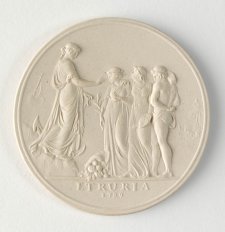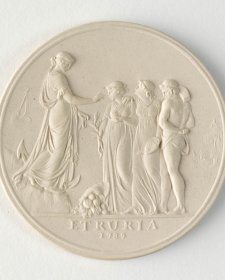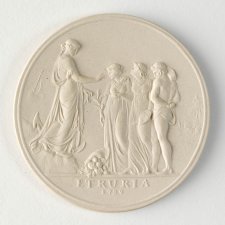Josiah Wedgwood, potter and industrialist, was apprenticed to his potter brother, Thomas, at an early age. When his brother denied him a partnership in the family business, he collaborated with the prominent potter Thomas Whieldon to establish his first pottery factory, in Burslem, Staffordshire, with Thomas Bentley (1730-1780) as his business partner. In the 1770s Wedgwood and Bentley established the Etruria works near Stoke-on-Trent. Jasperware, granularly textured stoneware with white bas relief, was introduced in 1774. In later life Wedgwood was a prominent advocate of the abolition of slavery, from 1787 using his Wedgwood Jasperware as a means to publicise the cause in Britain and America. The plaque of Cook is thought to be one of a series of ‘Illustrious Moderns’ produced by Wedgwood and Bentley comprising portraits of scientists, philosophers, doctors and statesmen of the times. Many of the Jasperware reliefs were designed by John Flaxman (1755-1826), who worked for Wedgwood from 1775 to 1787, before he cemented his illustrious reputation as a sculptor and draughtsman.
Wedgwood’s plaque portrait of James Cook is based on an engraving executed by James Basire after the painting by William Hodges, the official artist on Cook’s second voyage.
Purchased with funds provided by Robert Oatley AO 2007
Mr Robert Oatley AO (7 portraits supported)



On one level The Companion talks about the most famous and frontline Australians, but on another it tells us about ourselves.



11 January 2016
The National Portrait Gallery mourns the loss of one our most generous benefactors, Robert Oatley AO.



1 January 2015
In recent years I have become fascinated by the so-called Sydney Cove Medallion (1789), a work of art that bridges the 10,000-mile gap between the newly established penal settlement at Port Jackson and the beating heart of Enlightenment England.